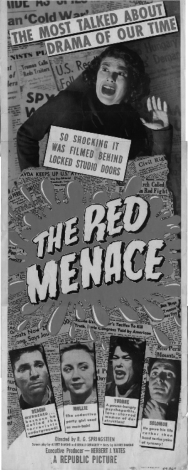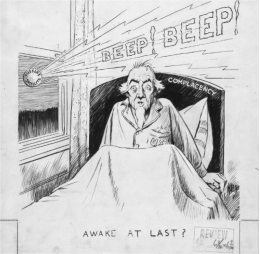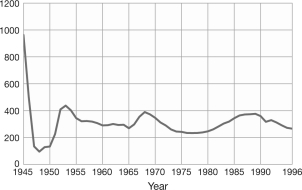A) Patience on the part of the United States in dealing with the Soviet Union.
B) A permanent military buildup and a global application of containment.
C) Limited strategic goals, confronting the Soviets only at key industrial areas.
D) A sole reliance on nuclear weapons in order to spare conventional forces.
F) A) and C)
Correct Answer

verified
Correct Answer
verified
Multiple Choice
All of the following statements are true of the Fair Deal EXCEPT:
A) the Fair Deal included a provision to expand public housing.
B) Congress passed Truman's Fair Deal to raise the standard of living for Americans.
C) the Fair Deal included a provision to increase the minimum wage.
D) the Fair Deal included a provision to create a national health insurance program.
F) A) and C)
Correct Answer

verified
Correct Answer
verified
Multiple Choice
Operation Wetback:
A) was the code name for a CIA operation conducted on the border between Texas and Mexico.
B) was how leftist news organizations described the McCarran-Walter Act.
C) was a military operation that rounded up illegal aliens found in Mexican-American neighborhoods for deportation.
D) was opposed by President Truman.
F) B) and D)
Correct Answer

verified
Correct Answer
verified
Multiple Choice
What reason did the Hollywood Ten give for not cooperating with the HUAC hearings?
A) They were all communists and did want to indict themselves.
B) Ronald Reagan had threatened that they would lose their jobs if they cooperated.
C) They were all busy making movies and did not have time to attend the hearings.
D) They felt the hearings were a violation of the First Amendment.
F) A) and C)
Correct Answer

verified
Correct Answer
verified
Multiple Choice
The Truman Doctrine (1947) Harry S. Truman At the present moment in world history nearly every nation must choose between alternative ways of life. The choice is too often not a free one. One way of life is based upon the will of the majority, and is distinguished by free institutions, representative government, free elections, guarantees of individual liberty, freedom of speech and religion, and freedom from political oppression. The second way of life is based upon the will of a minority forcibly imposed upon the majority. It relies upon terror and oppression, a controlled press and radio, fixed elections, and the suppression of personal freedoms. I believe that it must be the policy of the United States to support free peoples who are resisting attempted subjugation by armed minorities or by outside pressures. I believe that we must assist free peoples to work out their own destinies in their own way. -The ideas evoked in the Truman Doctrine are most similar to the concepts associated with
A) Puritanism.
B) Manifest Destiny.
C) progressivism.
D) the Fourteen Points.
F) A) and B)
Correct Answer

verified
Correct Answer
verified
Multiple Choice
The policy of "containment" can best be described as:
A) preventing the expansion of U.S. economic interests in Latin America to appease growing unrest in impoverished regions.
B) a focus on the containment of further military conflict in the postwar world.
C) preventing the spread of communism worldwide.
D) George Kennan's theory that the United States must pursue normal relations with the Soviet Union, or fail to contain Chinese postwar aggression.
F) B) and D)
Correct Answer

verified
Correct Answer
verified
Multiple Choice
Why was it inevitable that the United States and the Soviet Union would eventually come into conflict after the war ended?
A) FDR had privately urged his advisers that the wartime friendly relationship between both nations could never last.
B) Historically, both nations had never shared long-term interests or values.
C) It was clear as early as the Tehran conference that Stalin had never intended to follow through on any of the Grand Alliance agreements.
D) Exploitation of Iran's northern oil fields suggested the Soviet Union was already ahead of the United States in postwar economic development.
F) A) and B)
Correct Answer

verified
Correct Answer
verified
Multiple Choice
All of the following statements about the Cold War's impact on American life are true EXCEPT:
A) the Cold War reshaped immigration policy.
B) Cold War military spending weakened the economy.
C) Cold War policy supported scientific research in medicine and computers.
D) the Cold War contributed to the dismantling of segregation.
F) A) and D)
Correct Answer

verified
Correct Answer
verified
Multiple Choice
Why did anticommunist Harry Truman veto the McCarran-Walter Act?
A) The anticommunist measures targeting immigrants did not go far enough for Truman.
B) The McCarran-Walter Act closely mirrored the Committee on Immigration's report, Whom Shall We Welcome, an investigative body commissioned by Truman's political enemies.
C) Truman had become alarmed at the excesses of the anticommunist crusade.
D) Truman did not actually veto the act, preferring to propose an alternative bill.
F) B) and C)
Correct Answer

verified
Correct Answer
verified
Multiple Choice
Why did American policymakers agree to spend billions of dollars on the economic recovery of Europe under the Marshall Plan?
A) They hoped to provoke the Soviet Union with this program.
B) They were trying to further solidify the division between the East and the West on the continent.
C) They were happy to provide their own constituents with profitable defense contracts.
D) They were afraid that if they did not help with the recovery, western European nations might fall into the Soviet sphere of influence.
F) B) and C)
Correct Answer

verified
Correct Answer
verified
Multiple Choice
Who were the "Dixiecrats"?
A) Members of the national press corps who covered the story of Strom Thurmond's breakaway from the Democratic Party.
B) Southern Democrats who walked out of the 1948 convention to form the "States' Rights Democratic Party."
C) Southern labor organizers who campaigned against passage of the Taft-Hartley Act.
D) Republicans who favored maintaining segregation in the South in support of the principle of states' rights.
F) None of the above
Correct Answer

verified
Correct Answer
verified
Multiple Choice
President Truman's civil rights plan called for all of the following EXCEPT:
A) a permanent federal civil rights commission.
B) national laws against lynching and the poll tax.
C) equal access to jobs.
D) reparations.
F) B) and C)
Correct Answer

verified
Correct Answer
verified
Multiple Choice
The principle of human rights-the idea of basic rights belonging to all persons because they are human-was introduced into international relations:
A) after the Holocaust.
B) after the dropping of the atomic bomb.
C) when NATO was established.
D) in the revolutionary period of the late eighteenth century.
F) B) and D)
Correct Answer

verified
Correct Answer
verified
Multiple Choice
What obstacle did Harry Truman face when he assumed the presidency following the death of Franklin Roosevelt in April 1945?
A) Roosevelt's popularity made it difficult for Truman to win the respect of Congress and the people.
B) At this time in the war, Americans were looking for a president with a military background, something Truman could not offer.
C) Truman had been such an aggressive power player in Congress that he was likely to face stiff opposition there.
D) Harry Truman had absolutely no experience in foreign policy, the most important qualification at this point in American history.
F) None of the above
Correct Answer

verified
Correct Answer
verified
Multiple Choice
How had the political climate changed in the South during World War II in the early Cold War years?
A) The mass exodus of African-Americans for the West Coast and Northeast left the region almost exclusively white.
B) The high concentration of prisoner-of-war camps in the region had made these southerners savvy in foreign affairs.
C) The number of African-Americans in the region that were registered to vote increased sevenfold.
D) In light of the fight against an enemy with a racial ideology, the states of the upper South abolished segregation and Jim Crow rule.
F) B) and C)
Correct Answer

verified
Correct Answer
verified
Not Answered
Document Based Question
Analyze the causes of American fear of communism from 1945 to 1960 and the effect it had on the American people.
Document 1
Source: President Harry S Truman, Address to Joint Session of Congress, March 12, 1947.
The very existence of the Greek state is today threatened by the terrorist activities of several thousand armed men, led by Communists, who defy the government's authority at a number of points, particularly along the northern boundaries. . . . Meanwhile, the Greek Government is unable to cope with the situation. . . . The United States must supply that assistance. We have already extended to Greece certain types of relief and economic aid but these are inadequate. . . . I believe that it must be the policy of the United States to support free peoples who are resisting attempted subjugation by armed minorities or by outside pressures. . . . There is no other country to which democratic Greece can turn.
Document 2
Source: President Harry S Truman, Statement on Detection of Soviet Atomic Test, September 23, 1949.
I believe the American people to the fullest extent consistent with the national security are entitled to be informed of all developments in the field of atomic energy. That is my reason for making public the following information.
We have evidence that within recent weeks an atomic explosion occurred in the USSR. Ever since atomic energy was first released by man, the eventual development of this new force by other nations was to be expected. This probability has always been taken into account by us.
Document 3
Source: Movie poster for The Red Menace, 1949.
 Document 4
Source: Joseph McCarthy, Speech at Wheeling, West Virginia, February 9, 1950.
The great difference between our western Christian world and the atheistic Communist world is not political, gentlemen, it is moral. For instance, the Marxian idea of confiscating the land and factories and running the entire economy as a single enterprise is momentous.
Today we are engaged in a final, all-out battle between communistic atheism and Christianity. . . . Unless we face this fact, we shall pay the price that must be paid by those who wait too long.
I have here in my hand a list of 205 . . . a list of names that were made known to the Secretary of State as being members of the Communist Party and who nevertheless are still working and shaping policy in the State Department.
Document 5
Source: Federal Aid Highway Act, June 29, 1956.
SEC. 108. NATIONAL SYSTEM OF INTERSTATE AND DEFENSE HIGHWAYS.
(a) INTERSTATE SYSTEM.-It is hereby declared to be essential to the national interest to provide for the early completion of the "National System of Interstate Highways," as authorized and designated in accordance with section 7 of the Federal-Aid Highway Act of 1944 (58 Stat. 838). It is the intent of the Congress that the Interstate System be completed as nearly as practicable over a thirteen-year period and that the entire System in all the States be brought to simultaneous completion. Because of its primary importance to the national defense, the name of such system is hereby changed to the "National System of Interstate and Defense Highways." Such National System of Interstate and Defense Highways is hereinafter in this Act referred to as the "Interstate System."
Document 6
Edwin Marcus, "Awake at Last," 1957, Library of Congress Prints and Photographs
Division.
Document 4
Source: Joseph McCarthy, Speech at Wheeling, West Virginia, February 9, 1950.
The great difference between our western Christian world and the atheistic Communist world is not political, gentlemen, it is moral. For instance, the Marxian idea of confiscating the land and factories and running the entire economy as a single enterprise is momentous.
Today we are engaged in a final, all-out battle between communistic atheism and Christianity. . . . Unless we face this fact, we shall pay the price that must be paid by those who wait too long.
I have here in my hand a list of 205 . . . a list of names that were made known to the Secretary of State as being members of the Communist Party and who nevertheless are still working and shaping policy in the State Department.
Document 5
Source: Federal Aid Highway Act, June 29, 1956.
SEC. 108. NATIONAL SYSTEM OF INTERSTATE AND DEFENSE HIGHWAYS.
(a) INTERSTATE SYSTEM.-It is hereby declared to be essential to the national interest to provide for the early completion of the "National System of Interstate Highways," as authorized and designated in accordance with section 7 of the Federal-Aid Highway Act of 1944 (58 Stat. 838). It is the intent of the Congress that the Interstate System be completed as nearly as practicable over a thirteen-year period and that the entire System in all the States be brought to simultaneous completion. Because of its primary importance to the national defense, the name of such system is hereby changed to the "National System of Interstate and Defense Highways." Such National System of Interstate and Defense Highways is hereinafter in this Act referred to as the "Interstate System."
Document 6
Edwin Marcus, "Awake at Last," 1957, Library of Congress Prints and Photographs
Division.
 Document 7
Source: U.S. Military Spending, 1945 -1996 (Billions of 1996 Dollars in Outlays), Center for Defense Information.
Document 7
Source: U.S. Military Spending, 1945 -1996 (Billions of 1996 Dollars in Outlays), Center for Defense Information.

Correct Answer

verified
Correct Answer
verified
Multiple Choice
The Century of the Common Man (1942) Henry Wallace We who live in the United States may think there is nothing very revolutionary about freedom of religion, freedom of expression, and freedom from the fear of secret police. But when we begin to think about the significance of freedom from want for the average man, then we know that the revolution of the past 150 years has not been completed, either here in the United States or in any other nation in the world. . . . I say that the century on which we are entering . . . can be and must be the century of the common man. Everywhere the common man must learn to build his own industries with his own hands in a practical fashion. Everywhere the common man must learn to increase his productivity. . . . No nation will have the God-given right to exploit other nations. Older nations will have the privilege to help younger nations get started on the path to industrialization, but there must be neither military nor economic imperialism. The methods of the nineteenth century will not work in the people's century. . . . As their masses learn to read and write, and as they become productive mechanics, their standard of living will double and treble. . . . Those who write the peace must think of the whole world. There can be no privileged peoples. We ourselves in the United States are no more a master race than the Nazis. And we can not perpetuate economic warfare without planting the seeds of military warfare. We must use our power at the peace table to build an economic pace that is just, charitable, and enduring. -Wallace's wartime speech foreshadowed
A) postwar decolonization.
B) policies based on collective security.
C) containment.
D) the military industrial complex.
F) None of the above
Correct Answer

verified
Correct Answer
verified
Multiple Choice
The Universal Declaration of Human Rights:
A) was immediately ratified by Congress.
B) was honored by both the United States and the Soviets.
C) included freedom of speech and religion.
D) was drafted by President Truman.
F) B) and C)
Correct Answer

verified
Correct Answer
verified
Multiple Choice
Civil rights initiatives after 1948:
A) waned, given widespread American sentiment that any criticism of American society smacked of "disloyalty."
B) continued in the same vein as those achieved during the Truman administration.
C) included enforcement of bans on discrimination in employment and housing.
D) remained a strong priority for the Democratic Party.
F) B) and C)
Correct Answer

verified
Correct Answer
verified
Multiple Choice
The impact of the Cold War on the civil rights movement:
A) was quite limited at the time.
B) was beneficial because the Urban League accepted communists into its ranks.
C) included government action against black leaders.
D) caused the NAACP to enlist the aid of the Soviets.
F) B) and C)
Correct Answer

verified
Correct Answer
verified
Showing 41 - 60 of 69
Related Exams